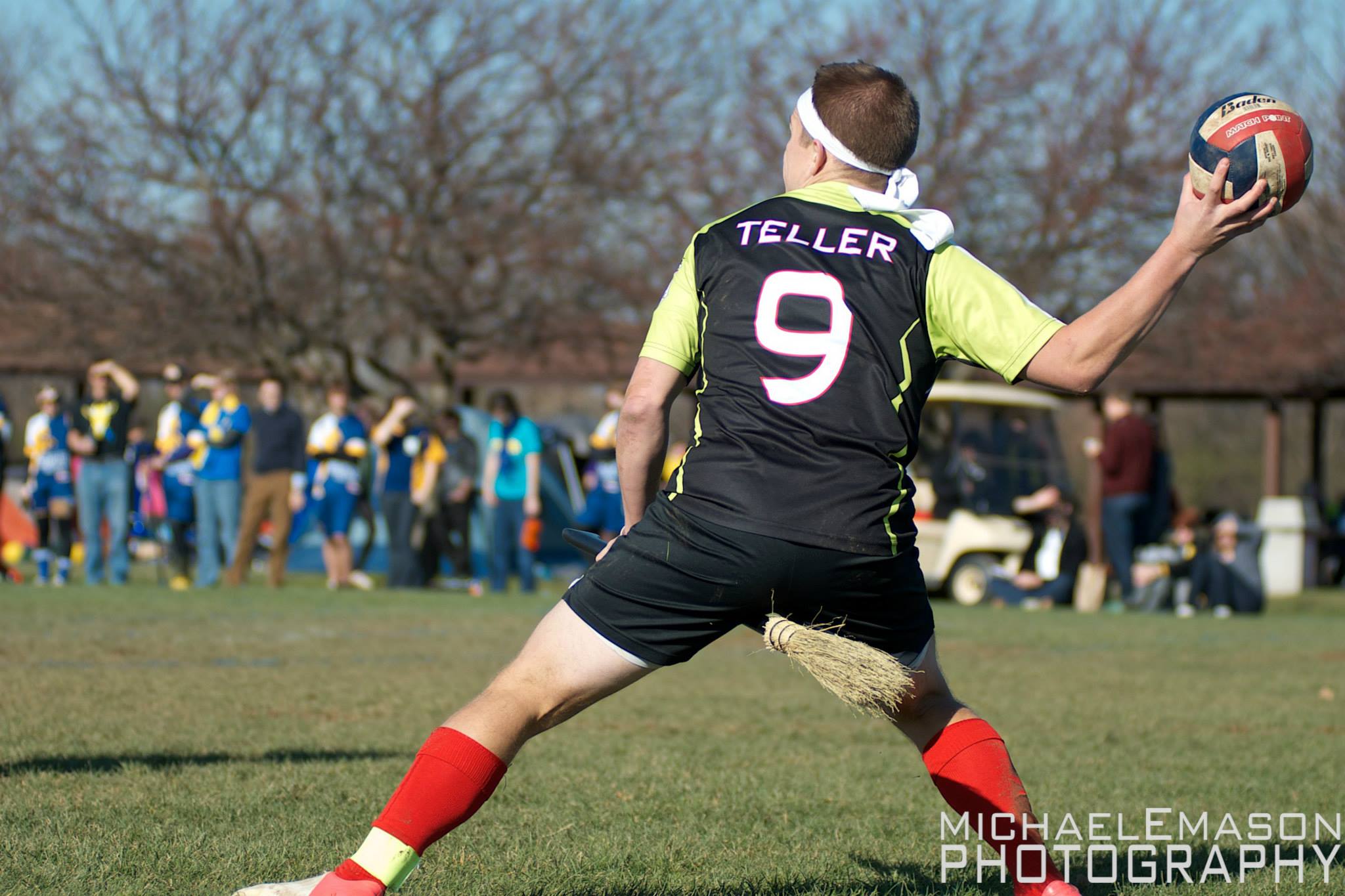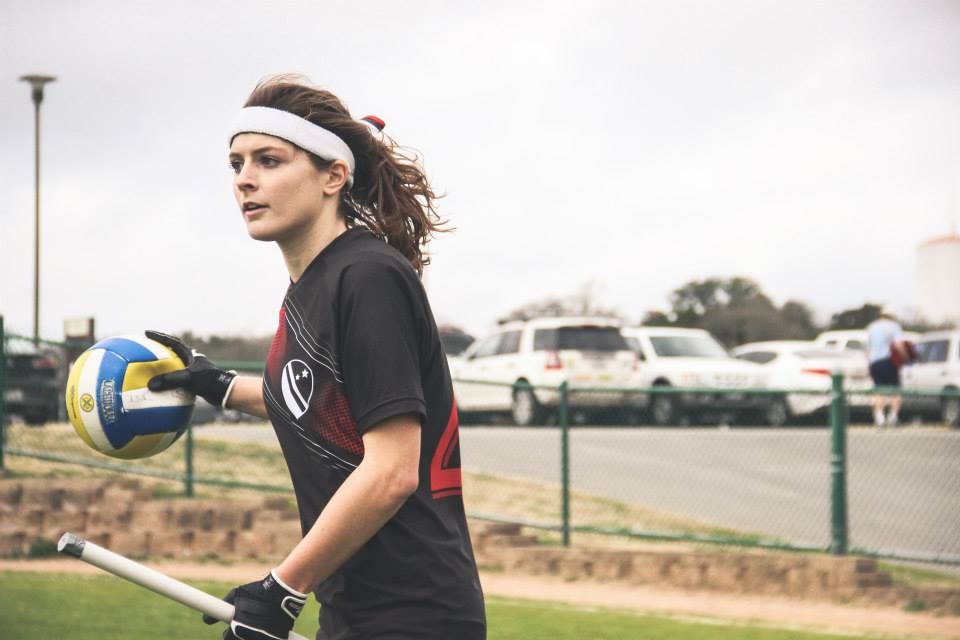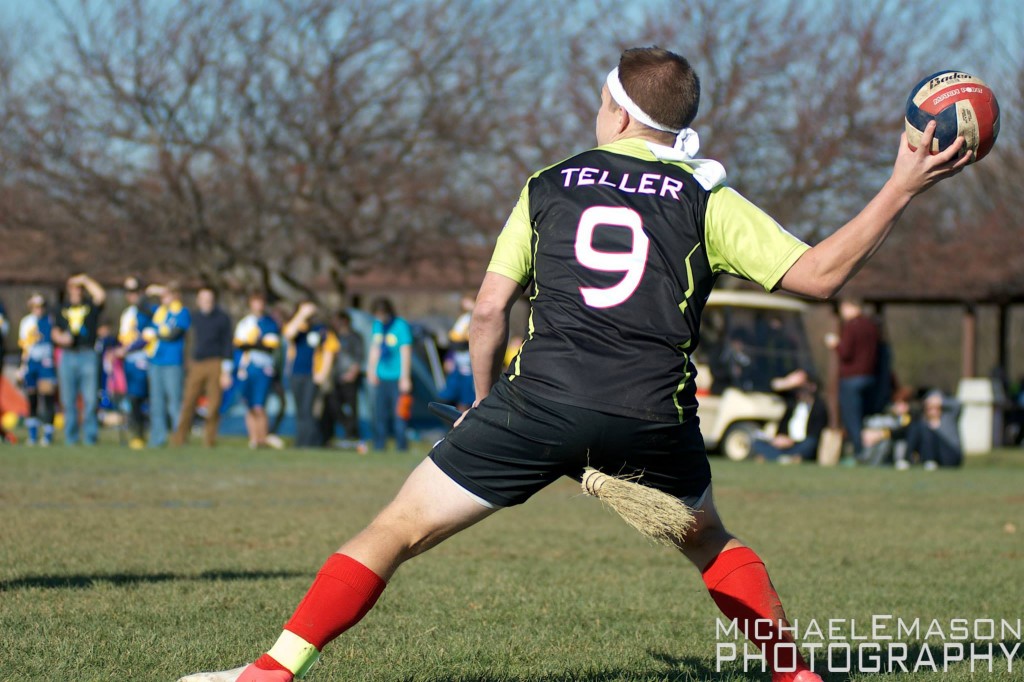- Rule, Britannia, no more?
- Unpopular Opinions: US Quadball Cup 2023
- Proven Contenders: University of Virginia
- Proven Contenders: Rutgers University
- Proven Contenders: University of Michigan
- Proven Contenders: Creighton University
- Different Perspectives: A Look Inside USA Ultimate
- Antwerp QC, Much of Belgian Core, Leaves Competitive Quidditch
A Not-So-Quiyk Draft Recap: Round Five
- Updated: February 11, 2014

Round Five has come and gone, and we’ve yet to see any major surprise come off the board yet, leaving me to attempt to nitpick tiny holes in the game of some of the sport’s best players. Honestly, these early rounds have been more about drafting strategy, shaping up teams, and balancing picks than they have been about the exact talent of those drafted. Maybe the next round will give us the first real shocker, but with so many big-name players still left, I’d doubt it. Expect to start seeing the jaw-dropping selections around Round Seven.
Round 5, Pick 33 (GM: Alex Wilson) – Peter Reynebeau, Chaser, Arkansas
Previous Picks: Sarah Holub, C, LSQC; David Gilbert, B, Baylor; David Fox, K, Emerson; Joey Reynebeau, C, Arkansas
Like a man going into KFC and getting a sandwich with fried chicken instead of a bun, Alex Wilson has doubled down. By taking the other brother Reynebeau in the second of his back-to-back picks, Wilson finally thinks he has his answer to “who is the distributor on your team”.
But, there are still some problems here. Firstly, while I think Peter Reynebeau is perfectly capable of running his team, I have trouble imagining that voters will be convinced of Fox’s ability to play off-ball, short of a massive shift to Emerson’s offense in the second half of the year. I think Fox has all the talent necessary and could completely thrive without the quaffle in his hands, but, at the same time, I have trouble imagining that voters will be sold on that sort of shift, and will instead pick on his struggles ball handling.
I don’t think the start of this draft has gone amazingly for Wilson; I rated him as the worst team last week, and I would likely continue that designation this week. And I don’t seem to be the only one: in Ben Nadeau’s poll in #IQAForums, Wilson’s team had received exactly 2 votes as the best team. But if I were looking for a team that could make a big move because of World Cup success, Wilson’s would be a team I’m looking at. I’m not saying that they’re guaranteed to, but Arkansas was a Porter Marsh snitch catch away from being an Elite Eighth team last year, and all reports seem to suggest they’re better this year – although, honestly, it’s difficult to tell when they’ve played so sparingly this season. Fox will likely be a crowd-pleasing name at World Cup again as he’ll likely put a strong Emerson team on his back as well, and Baylor, despite somehow getting eclipsed in the spotlight by A&M, Texas, and Lone Star, has shown the ability to compete with anyone.
I wouldn’t guess that this team is going to end up near the top, but let’s just say I wouldn’t be surprised if they made a big jump at World Cup. Even with one pick, Wilson’s success was tied to Arkansas. He’s in bed with them now; we’ll see soon if they deliver.
Round 5, Pick 34 (GM: Amanda Dallas) – Steve DiCarlo, Lost Boys QC, Seeker/Utility
Previous Picks: Tony Rodriguez, K, LB; Max Havlin, B, BU; Katrina Bosotti, B, BU; Becca DuPont, C, A&M
I’m of two minds on this pick. Let’s start with what I like. First off, let’s look at historical data. Since moving to the west, in an official game, Steve DiCarlo has lost a snitch grab only twice: a just off-field snitch catch from the Skrewts and the marathon of a World Cup VI quarterfinal against Bowling Green. He seems to have a knack for being able to get snitch grabs exactly when his team needs them.
As a chaser, he manages to be much more than the sum of his parts. While DiCarlo is athletic, he’s small. He’s quick, but not overly so. However, he plays extremely intelligently, and so he’s able to take maximal use of the gifts he has, sliding into soft spots in the defense and generating a surprising amount of goals. In addition, there’s instant chemistry between Dallas’s starting keeper Rodriguez and DiCarlo, and he may be the biggest “celebrity” in the quidditch world at this point, especially during his Opposite Worlds appearance.
But there are also issues here. While DiCarlo does an excellent job of maximizing his talent, there were still many big-name chasers out there who are clearly better than him, such as the Lost Boys’s Jeff Lin, Texas’s Kenny Chilton, and Miami’s Sean Beloff. I’d argue that there are even people who are considered chaser/seeker hybrids who are clearly stronger chasers than DiCarlo, which means that if approaching this as a strong pick, it has to come from the angle of a seeker who happens to be able to play chaser at a competent level as well, rather than a seeker who can chase at a very high to elite level.
This certainly makes DiCarlo worth more than a pure seeker – than say a Porter Marsh – but I think very soon we’re going to start seeing the answer to a question: when will “pure” seekers be drafted in this draft? When this draft was at 12 players per team, I thought that pure seekers weren’t going to go very early in the draft, as it’s very easy to make sure your team has at least one “elite” seeker. With 16, taking more specialized positions is more reasonable, and so pure seekers seem more likely to contribute. DiCarlo isn’t a pure seeker, but he’s the first pick I’d argue contributes more as a seeker than at any other position. I’d expect to see more of the pure seekers begin to come off the board soon.
Round 5, Pick 35 (GM: Dan Hanson) – Missy Sponagle, Lost Boys QC, Chaser/Utility

Because we didn’t need much of an excuse to post more high-quality pictures of Missy Sponagle. Credit: Lauren Carter
Previous Picks: Drew Wasikowski, C, Texas A&M; Chris Seto, B, LB; Kifer Gregoire, C, Texas A&M; Alex Browne, K/C, LB
As I reach for the most obscure comparison I can in this article, I have to assume that Hanson is a big fan of American Playwright David Ives. Ives’s collection of one-act plays is usually presented under the title of another play, All in the Timing, and while I’m relatively sure that Hanson has never seen or heard of it – it’s actually pretty spectacular see it if you can – it seems to be the motto for his last two picks. Both of these picks came in just before Diamond Cup, where Alex Browne, his previous pick, and Sponagle would play as key cogs for an undermanned but extremely resilient Lost Boys squad. If they hadn’t been drafted yet, these would be two players whose stock would shoot up the board – they were two players I would have had as extremely solid sleepers even before Diamond Cup. And so, Hanson benefits from his extraordinary timing, getting two great players arguably later than their skill suggests they should have been.
In Sponagle, Hanson gets a player who has shown an ability to play every single position – and I do actually mean all four positions – with proficiency. Her tenacity has shown her to be a surprisingly adept seeker with a flair for making fantastic catches. She was able to fill in strongly as a beater for UCLA’s team in their World Cup run. She was able to fuel her team as a ball handler and keeper at Firemercs. And, of course, she is best known as an elite chaser. Hanson right now certainly seems to have the most complete team.
Round 5, Pick 36 (GM: Evan Bell) – Jeffrey Lin, Lost Boys QC, Chaser/Seeker
Previous Picks: Brittany Ripperger, B, Baylor; Brendan Stack, K, BU; Chris Rhodes, B, Baylor; Aryan Ghoddossy, C, UT
Value is the name of the game here. With every major position except female chaser accounted for, Bell can feel free to go in almost any direction he wants, and rather than filling out every position, Bell picks up the Lost Boys’s Lin. Lin is extremely underappreciated, but for as little as he talks about himself, Lin is every bit an elite chaser. He was a key cog in UCLA’s semifinal team, turning into a brick wall as a point defender, and consistently fueling UCLA with his tireless effort.
With this pick, Bell gets someone who could be argued as the best chaser left in the draft, and simply ensures that he’s filling out his roster. I’ve argued multiple times for the advantages of heavily buffing up a chaser line, so you won’t see me complaining about a solid pick that likely won’t generate much fanfare. Truly, I think this is a great pick.
Round 5, Pick 37 (GM: Beto Natera) – Kedzie Teller, Boston Massacre QC, Chaser/Seeker

For a general manager who waited to go after chasers, Teller was pretty much a perfect pick. Credit: Michael E. Mason/IQA Staff
Previous PIcks: Stephen Bell, K, LSQC; Mollie Lensing, B, LSQC; Hope Machala, K, LSQC; Sean Paogada, U, FF
Natera continues his tour through various community teams around the country, as Kedzie Teller now is #QCBDrafted. A couple of years ago, Teller probably had the fastest brooms up to quaffle time in the country, and while the field has caught up with him a bit, Teller’s speed still ranks with the best in the country. But that doesn’t mean that he can’t back it up with power: Teller is a shockingly hard hitter, able to lay out anyone on the pitch. The Massacre captain is a large part of why the fairly undermanned team has been able to have a solid debut season, playing extremely competitive games with the best teams in the Northeast region. Watching him fly across the pitch, it’s no shock that he used to be a sprinter for Boston University, where he also anchored the quidditch team after stepping away from track for good.
With two female beaters in his pocket and in my opinion the best male keeper already on his team, along with Pagoada to fill any gaps, it really felt like Natera needed to firm up his chasing line, and he’s off to a good start with this pick. Ultimately, you’ll almost never see me condemn a pick where someone picks the best player available at a position. Teller is clearly in the discussion for best chaser available, and grouping him with Bell and Paogada gives him a solid combo that may not be on the level of some of the best chaser lines in the draft, but at least could hold their own . Given that Natera invested two of his first picks on beaters, that’s some solid value. Plus, he now has players from three different regions, which will likely help the popularity contest aspect of the draft.
Round 5, Pick 38 (GM: Andrew Canto) – Melissa White, LSU, Chaser/Beater
Previous Picks: Augie Monroe, K, UT; Kody Marshall, C, LSQC; Adam Richardson, C, UCLA; Harry Greenhouse, C/S, Maryland
Canto continues to enhance his chaser core with another timing pick. White has long been considered one of the elite female chasers, but whether she was actually playing this year seemed a bit of an open mystery until she made her debut at Diamond Cup. In addition, White beating was a closely-guarded secret by LSU, and with her showing the ability to do so at a high level, Canto’s pick gets an added dimension of versatility.
I’ve discussed multiple times how versatile players aren’t worth quite as much in a draft with 16-player teams as they would in 12-player teams, so I won’t rehash that argument here, but that doesn’t mean that versatile players aren’t still worth a little bit extra. Given that White was already considered one of the best chasers in the world, on par with any chaser drafted so far, this pick has to be considered spectacular value. There’s more to say here, but it ties in closely with the next pick.
Round 5, Pick 39 (GM: Zach D’Amico) – Audrey Wright, UT, Chaser:
Previous Picks: Vanessa Goh, C, LB; Peter Lee, B, LS; Zach Luce, K, UCLA; Michael Powell, C, BU
D’Amico came into this pick in a great position. He had a female chaser, a male beater, a male keeper and a male chaser. In other words, he’s made absolutely no declarations about the intentions of his team, other than that he’s essentially guaranteed to not play two female beaters as his primary lineup. What that means is that with this pick he had the ability to take whoever he thought was the single best player on the board relative to his or her position, and allow his team composition to pivot around this pick accordingly.
In that position, D’Amico selected Wright of Texas, who scored a hat trick in the World Cup final last year. I feel like this is a relatively unremarkable pick, in that all D’Amico did was…take a really good player. I think this is just an all-around solid pick. Even more impressively, I feel like D’Amico has managed to push off pigeonholing his teams composition for yet another round: while one may expect him to lean towards a two male beater set now, he certainly needed someone to give Goh some rest during games, and so he’s still in position to select anyone he may wants.
Round 5, Pick 40 (GM: Hank Dugie) – Keir Rudolph, Kansas, Seeker/Utility:
Previous Picks: Chris Morris, U, LSQC; Simon Arends, C, LSQC; Daniel Daugherty, K/C, BGSU; August Luhrs, C/S, USC
In case you’ve avoided reading Dugie’s exaggeration-laden justification for his picks, let me spell out what has thus far been Dugie’s drafting strategy: Hank Dugie wants athletic people on his team. He wants his team to run faster, hit harder, and stretch out their arms farther than any other team. Unfortunately for Hank, this is not his fine morning. Just about everyone chosen so far is an elite athlete – at least in context of quidditch – and you could easily argue that there are more athletic teams than his, even amongst general managers who haven’t been focusing on that aspect as much.
However, even more damningly, Rudolph derives almost his entire value from his job as a seeker. In the context of today’s average skill levels, Rudolph is a good but not great keeper, even with his elite athleticism. He is indisputably an elite seeker, but there are plenty of other people who fit that mold and who won’t go off the board for many rounds to come. In fact, I’d argue that Dugie already has someone who fulfills the exact same balance as Rudolph does in August Luhrs.
Seeker is not a position that teams should be doubling up on early, as not only does only one of them play at a given time, they also only really play for a small portion of the game. Sure, Dugie has an athletic team, but there are clearly teams with better chaser compositions with arguably just as strong beating games. I have trouble seeing where Dugie’s team can match Canto’s team, and that’s even before you consider that Canto’s team has better positional balance too, having already selected a female chaser. We’ll see how well Dugie’s bravado sways the voters – it seems to have worked in the #IQA Forums poll – but it sure isn’t swaying me right now.
